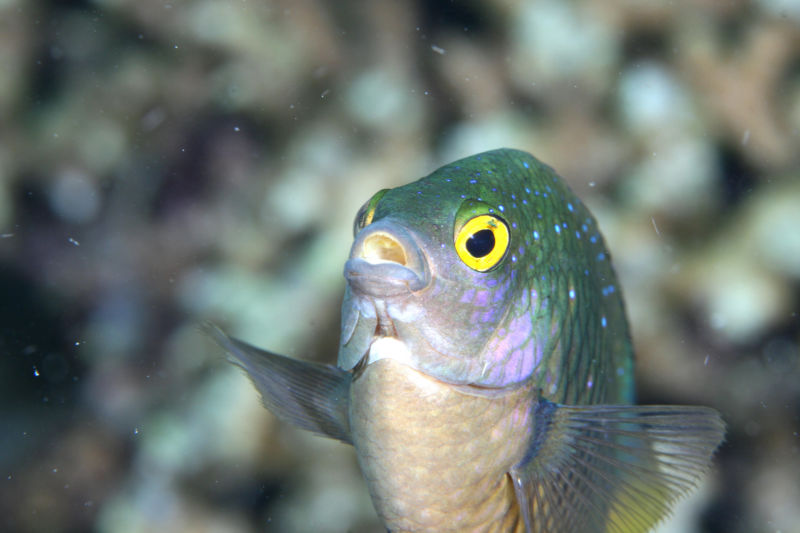
In the academic equivalent of "shots fired," a newly published paper evaluates a number of prior studies on the effects of ocean acidification on fish—and finds it can't replicate any of the results.
A number of studies in recent years has conducted experiments on the behavior of coral fish in normal and high-CO2 water. (Increasing dissolved CO2—which is happening due to human-caused emissions—lowers the pH of seawater, hence the term "acidification.") These studies have found some surprising impacts, from a failure to recognize and avoid the smell of a predator to a loss of "handedness" (preferring left or right turns) during development. These behaviors have been linked to CO2 interfering with a specific receptor in the brain.
Individual variation
But a group of researchers found itself skeptical of these results and hatched a plan to replicate them in a standardized experimental setup. Over the course of several years, the researchers repeated some of these experiments with a variety of fish species, carefully documenting and filming each step to create an accessible database of results. And those results seem markedly different.
One experiment examined the activity level for 582 fish from six species, using tracking software and video to measure distance moved. In initial tests, two species showed at least some activity increase in high-CO2 water, ranging from 50 to 90 percent. However, follow-up tests with different fish of those species didn't show an increase. There was a lot of individual variability, so tests with too few individuals could produce results that aren't representative.
The story for experiments on "handedness" was similar. In a small "maze" with T-shaped intersections, the researchers measured the number of left and right turns with 400 fish from five species. Three species showed no signs of handedness in either normal or high-CO2 water. Two species did in the normal water, with one showing reduced handedness in the high-CO2 water. When some of those fish were retested a week later, the effect disappeared.
Finally, there were tests in which the odor of a predator was added to part of the tank, and the amount of time the fish spent within or outside that portion was measured. These experiments were done with a similar sample of six species. In contrast to previous studies, the researchers only saw an effect in one species. That was true for captive-reared juveniles, but a second test with wild-caught individuals of varying ages showed no effect.
And this is where the new paper turns a little spicy. For the other experiments, the authors conclude that small sample sizes and wide individual variability could account for the different results seen in previously published studies. But they say the previous predator odor experiments got much stronger effects with much lower individual variability.
Replication or not?
Because they ran slightly longer experiments (around 20 minutes long instead of 10), the researchers trimmed their data and pulled out 10,000 combinations of datapoints simulating experiments with smaller sample sizes. They got zero datasets that match the large effect and small variability of previous studies.
"Inter-individual variation," they write, "enables the persistence of populations and species and is a fundamental biological phenomenon on which selection acts; results showing negligible variation (particularly for behaviours that are inherently variable) should be viewed with caution."
Ars reached out to Danielle Dixson, one of a number of researchers behind the predator-odor experiments (including one we'd covered), for her thoughts on the new paper.
She said:
It is not surprising that the experimental findings from Clark et al. differ from those we collected in the past, as a number of methodological changes were made and therefore a direct comparison between the studies is inappropriate. The Clark study used different fish species at a different life stage (adult/sub-adult compared to larvae or very early juveniles) or one juvenile fish species that was collected from a public aquarium (compared to naive lab-breed or light trap collected). This change alone required different equipment, a different experimental set up, and means that animals tested have had different experiences and exposure to the chemical cues than in previous work.
Dixson said that other studies had previously confirmed their findings, adding, "As technology and our understanding of the topic has advanced, so have the predictions on community-wide impacts. For example, a recent study demonstrated that the natural fluctuations of CO2 on a coral reef dampens the impact of CO2 in fish behavior compared to initial studies[…] It was our goal in 2009 to shine a light on this important topic, and we continue to be supportive of other scientists who are interested in advancing the field of coral reef climate change research."
Apart from stirring the pot, the new study muddies the waters a bit by showing that the impacts on fish are, at the least, more complex than they've seemed in the past. Coral reef fish do have more to worry about than just any direct biological effects of ocean acidification, between impacts at the base of the food web, warming waters, and reef bleaching. Still, any positive news is welcome.
Nature, 2019. DOI: 10.1038/s41586-019-1903-y (About DOIs).
"fish" - Google News
January 14, 2020 at 04:15AM
https://ift.tt/2uNjxNl
Replication study challenges work on fish and ocean acidification - Ars Technica
"fish" - Google News
https://ift.tt/35JkYuc
Shoes Man Tutorial
Pos News Update
Meme Update
Korean Entertainment News
Japan News Update
Bagikan Berita Ini














0 Response to "Replication study challenges work on fish and ocean acidification - Ars Technica"
Post a Comment